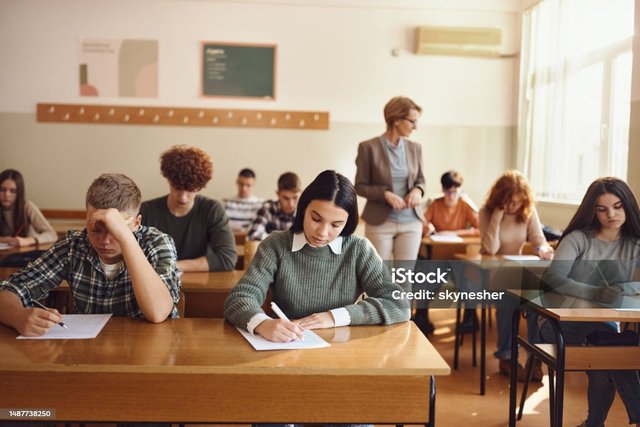 )
https://istockphoto.6q33.net/c/246195/270498/4205https%3A%2F%2Fwww.istockphoto.com%2Fphoto%2Feducational-test-in-high-school-gm1487738250-513122575&adplacement=srp_freephoto_top-thumbs&sharedid=student+in+exams+room&adid=128108
)
https://istockphoto.6q33.net/c/246195/270498/4205https%3A%2F%2Fwww.istockphoto.com%2Fphoto%2Feducational-test-in-high-school-gm1487738250-513122575&adplacement=srp_freephoto_top-thumbs&sharedid=student+in+exams+room&adid=128108
Examinations have long been view as a major way of assessing a student knowledge and capabilities in educational sector. However, it is increasingly evident that exams have limitations in capturing the full extent of a student true skills and talents. While exams can and has always provide some valuable insights into certain aspects of learning, experiences over the years has proven that they often fall short in accurately reflecting a student's true knowledge and abilities.
The Disadvantages Of Traditional Examinations
(*) Examinations, by their nature, are limited in their ability to provide a complete evaluation of a student's true knowledge and abilities as they often tend to focus more on a student ability to memorise and repeating of information rather than encouraging critical thinking, creativity, problem solving skills, and practical application. Additionally, the time constraints and pressure of exams can hinder an individual students' ability to demonstrate their true potential.

https://istockphoto.6q33.net/c/246195/270498/4205?u=https%3A%F%2Fwww.istockphoto.com%2Fphoto%2Fanxious-teenage-student-sitting-examination-in-school-hall-gm887313506-246272890&adplacement=srp_freephoto_top-thumbs&sharedid=student+having+difficulty+in+examination+room&adid=1281084
(*) While exams may be effective in assessing certain types of knowledge, they often fail to capture skills such as communication, teamwork and adaptability, all of which are crucial in today's rapidly changing world.
A More Comprehensive Approach
Although It is important to acknowledge that examinations do serve a purpose in assessing certain types of knowledge and skills, however, relying solely on it as the primary assessment method neglects the diverse range of abilities that an individuals possess. To address this limitation, educators and institutions should consider incorporating a variety of assessment methods to provide a more comprehensive evaluation of student's knowledge and capabilities.
Alternative assessment methods, such as project based assessments, portfolios, presentations, simulations, and peer evaluations, offer opportunities for students to demonstrate a wide range of skills and competencies beyond what exams can measure. These methods allow for a more personalised and authentic assessment that reflects real life challenges and events.
Real life Situations and In depth Analysis:
Consider a student who excels in hands-on projects and practical applications but struggles with traditional exams. Evaluating this student solely based on exams would underestimate their true potential and capabilities. Yes by adopting alternative assessment methods, such as project based assessments or hands-on simulations, educators can provide a more accurate and holistic picture of the student's skills and talents.
.jpg)
https://istockphoto.6q33.net/c/246195/270498/4205?u=https%3A%2F%2Fwww.istockphoto.com%2Fphoto%2Fgroup-of-multiethnic-colleagues-having-fun-team-building-concept-gm1358421865-432050733&adplacement=srp_freephoto_top-thumbs&sharedid=student+doing+well+in+groups+projects&adid=1281084
It is interesting to note that, researches conducted over the years has shown that alternative assessment methods has and can lead to higher levels of student engagement, motivation, and creativity. By diversifying assessment methods, teachers can create a more conclusive and supportive learning environment that caters to the individual strengths and needs of each student.
Conclusion:
In conclusion, while examinations have been a traditional method of assessing knowledge and capabilities, they are not without their limitations. To truly capture the diverse talents and skills of an individuals, it is important that we move beyond exams and embrace a more comprehensive approach to assessment. By incorporating alternative assessment methods, educators can provide a more accurate, authentic, and inclusive evaluation of students' knowledge and capabilities. It is time to shift the focus from testing what students knows to assessing what they can do with their knowledge – a means that will better prepare them for success in this our ever changing world.
Hi, we have checked your post with the tool gptzero, we are very confident that your text is written by AI. Do you want to admit it?
Please note that the Steemit platform is a clean place from all forms of cheating, plagiarism and AI are forms of cheating. Everyone who is on this platform always produces work from the results of their own thoughts.
Cc.
@steemcurator01
@steemcurator02
Downvoting a post can decrease pending rewards and make it less visible. Common reasons:
Submit
I sincerely want to use this medium to say that I am very very much sorry for breaking one the most important rules guarding this unique platform.
Please I beg for mercy and forgiveness as I promised never to repeat it again, it's not my not style of writing, I don't know what came over me but I think I have learned my lesson.
Once again am sorry
Downvoting a post can decrease pending rewards and make it less visible. Common reasons:
Submit
Make a short post apologizing in the community, and promise not to do it again so we can remove the warning label.
Downvoting a post can decrease pending rewards and make it less visible. Common reasons:
Submit
Good morning, hope you had a wonderful night rest. Just want to imform you that i have done what you asked me to. Pls am so sorry it will never happen again
Downvoting a post can decrease pending rewards and make it less visible. Common reasons:
Submit
My team are discussing, We will continue to monitor your posts in other communities. If there is a change we will remove the label.
Downvoting a post can decrease pending rewards and make it less visible. Common reasons:
Submit
My x promotion link
https://t.co/MvjYzs275f
Downvoting a post can decrease pending rewards and make it less visible. Common reasons:
Submit